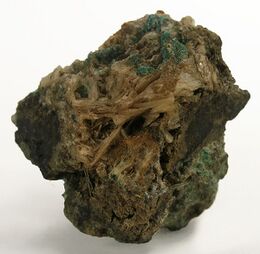Chemistry:Lanarkite
From HandWiki
Short description: Lead sulfate mineral
| Lanarkite | |
|---|---|
 | |
| General | |
| Category | Sulfate minerals |
| Formula (repeating unit) | Pb2(SO4)O |
| Strunz classification | 7.BD.40 |
| Crystal system | Monoclinic |
| Crystal class | Prismatic (2/m) (same H-M symbol) |
| Space group | C2/m |
Lanarkite is a mineral, a form of lead sulfate with formula Pb2(SO4)O. It was originally found at Leadhills in the Scottish county of Lanarkshire, hence the name. It forms white or light green, acicular monoclinic prismatic crystals, usually microscopic in size. It is an oxidation product of galena.
In 2023, Lanarkite was used by Korean physicists in an attempt to make LK-99, a material evaluated for room-temperature superconductivity.[2]
References
- ↑ Warr, L.N. (2021). "IMA–CNMNC approved mineral symbols". Mineralogical Magazine 85 (3): 291–320. doi:10.1180/mgm.2021.43. Bibcode: 2021MinM...85..291W.
- ↑ Bob Yirka, Korean team claims to have created the first room-temperature, ambient-pressure superconductor, Phys Org, 27 July 2023
 |

